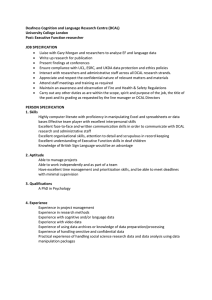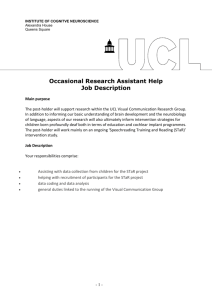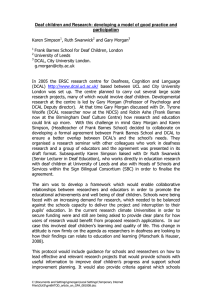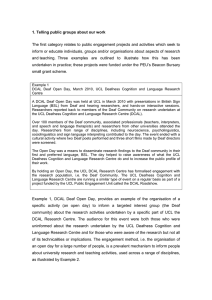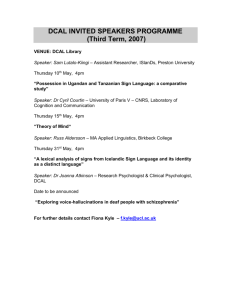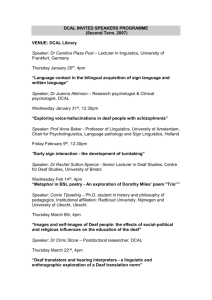DCAL: The First Ten Years A Celebration! Welcome to DCAL’s eNewsletter
advertisement
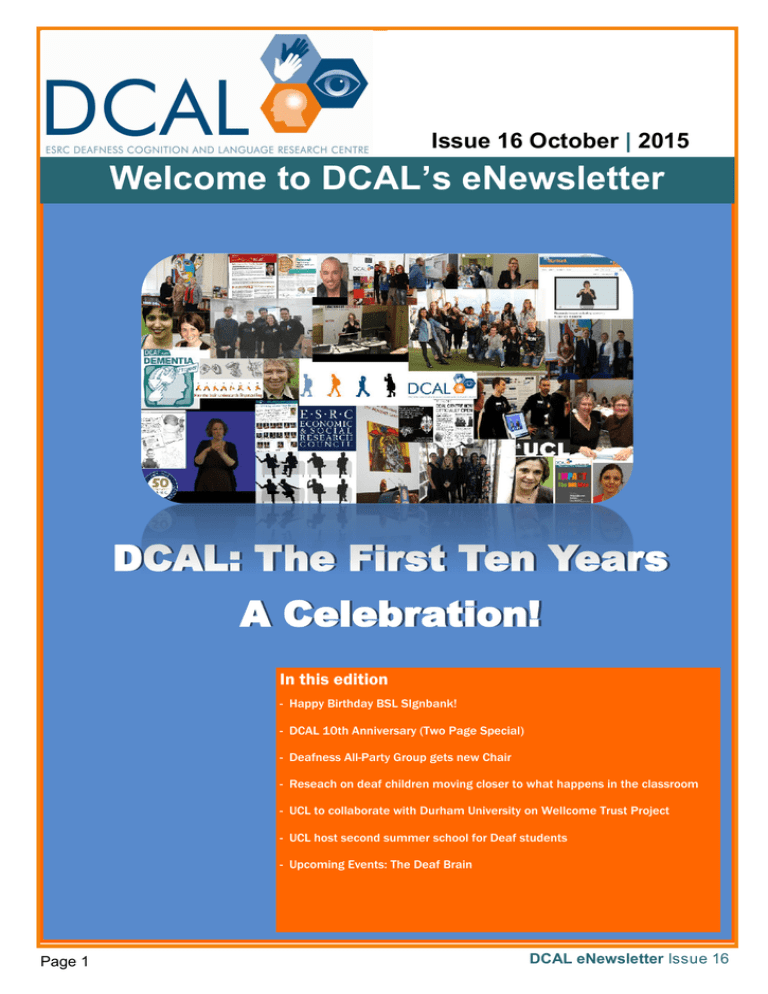
Issue 16 October | 2015 Welcome to DCAL’s eNewsletter DCAL: The First Ten Years A Celebration! In this edition - Happy Birthday BSL SIgnbank! - DCAL 10th Anniversary (Two Page Special) - Deafness All-Party Group gets new Chair - Reseach on deaf children moving closer to what happens in the classroom - UCL to collaborate with Durham University on Wellcome Trust Project - UCL host second summer school for Deaf students - Upcoming Events: The Deaf Brain Page 1 DCAL eNewsletter Issue 16 public engagement and widening participation activities. DCAL is moving into the future with new research and teaching programmes. Our short courses provide Continuing Professional Development for Deaf and hearing professionals, such as Deaf teachers of BSL, Deaf classroom assistants, speech and language therapists, psychologists, teachers, interpreters, etc. From the Director’s Chair This year is a very important milestone for the Deafness Cognition and Language Research Centre (DCAL) as we will be celebrating our 10th anniversary. I really cannot believe that ten years has passed since the Centre was established. I know this is sometimes used as a cliché but it really does only feel like yesterday that we embarked on our innovative and very exciting agenda of research work. To mark 10 years of achievement, we are holding a day of celebration on Friday 13th November, with a number of free events, talks and exhibits, including an exhibition showcasing DCAL’s achievements over the 10 We are also growing and developing postgraduate programmes in sign language and -year period since its inception. Deaf studies, and in interpreting and These achievements include ground-breaking translation. The exhibition also highlights research publications, the development of some of these new activities. language and cognitive assessments for deaf I do hope you can join us. children and adults, a monthly national NHS clinic for deaf adults with memory problems, BSL Signbank, the first on-line BSL dictionary based on data from hundreds of signers across the UK and an array of award-winning Prof Bencie Woll, Director Bencie DCAL eNewsletter Issue 16 Page 2 Happy Birthday BSL Signbank! In September, BSL Signbank, the first ever British Sign Language (BSL) usage-based dictionary, celebrated its first birthday. To mark this special milestone, researchers working on the project have released new regional information about signs for colours, countries, numbers and UK place names, four categories which are known to show a wide range of variation across regions in the UK. Launched a year ago, BSL Signbank is a dictionary that has been developed by researchers at DCAL. BSL Signbank differs significantly from other dictionary-type BSL resources because it has been developed in a way that more consistently uses the same principles as dictionaries for spoken languages. Until BSL Signbank was established, online dictionaries available to BSL users and people learning the language just consisted of BSL signs that are translation equivalents of English words, perhaps based on information from only a small number of people. The new pages published on the BSL Signbank website now show the regional distribution of each sign. For colour, country and number signs, there is now additional information about which sign variants are traditional across 8 regions: Belfast, Birmingham, Bristol, Cardiff, Glasgow, London, Manchester, and Newcastle. This is based on a task from the BSL Corpus, where 249 Deaf people from these 8 cities were asked for their signs for these concepts. “British Sign Language (BSL) is a rich, naturally evolving language, where the signs you use can vary according to where you live and where you went to school,” explains Dr Kearsy Cormier, Director of the BSL Corpus Project and now one of the leading researchers working on BSL Signbank. “Just like in British English, where you may call a bread roll a 'bap', 'barm' or 'cob', partly depending on where you grew up, the vocabulary of BSL can differ depending on region. We are pleased to be able to provide, for the first time, empirical evidence of regional associations of so many BSL signs, along with information about which signs are traditional to that region or not.” More information on BSL SIgnbank can be found on http://bslsignbank.ucl.ac.uk Page 3 DCAL eNewsletter Issue 16 DCAL Ten Years On - Let’s Celebrate! As the Deafness, Cognition and Language Research Centre reaches its tenth year, the DCAL staff and students are rolling out the barrel to mark a decade of achievement. DCAL at University College London was established in 2006 with funding from the Economic and Social Research Council (ESRC). DCAL brings together leading Deaf and hearing researchers in the fields of sign linguistics, psychology and neuroscience. It is the largest research centre in the field in Europe, with around 30 research students, research staff and associates, about one third of whom are Deaf. Over the last ten years DCAL’s research has covered a wide range of topics, from exploring the Deaf brain, BSL linguistics and language development in deaf children (spoken and signed), through to the psychology of deafness. To kick off a month of celebrations, DCAL will be launching an exhibition on 4th November, which will chronologically showcase the Centre’s ground-breaking and awarding-winning research, as well as landmark events over the past 10 years in a fun and interactive way. The exhibition will run until 3rd December and entry is free. For more information on the exhibition, please visit our website at http://www.ucl.ac.uk/dcal or email us on dcal@ucl.ac.uk DCAL eNewsletter Issue 16 Page 4 DCAL’s principal day of celebration will take place on Friday 13th November, at UCL North Cloisters. The day will run from 10am to 8pm and it will be packed full of of talks, interactive activities, games, exhibits, an early evening social and much, much more. Commenting on the events, DCAL’s Director, Prof. Bencie Woll, said: “This is a wonderful milestone for DCAL to reach and I would like to sincerely thank all the staff and students that have played a part in the Centre’s extraordinary success. I know current staff and research students have been planning these celebrations for a number of months now and are very much looking forward to sharing what we have achieved and what we will be doing in the future, with the wider academic community and the general public.” The event is free to attend but places are limited. If you would like to be there on 13th November, then please book your place by visiting DCAL’s Eventbrite webpage. Programme 10:00 – 10:30 Arrival and registration with refreshments 10:30 – 10:35 Welcome from Bencie Woll 10:35 – 10:45 Address from Joy Todd (Strategic Lead for Health and Human Behaviour Research, ESRC) 10:45 – 10:55 Address from David Shanks (Head of Division of Psychology and Language Sciences, UCL) 10:55 – 11:05 Address from Toby Burton (CFO, Global Circulation, The Economist; DCAL Advisory Committee member; former UCL student) 11:05 – 11:40 Bencie Woll: DCAL’s impact – looking back and looking ahead 11:40 – 12:05 Kearsy Cormier: Understanding BSL structure and use 12:05 – 12:30 Gabriella Vigliocco: What if the study of language started from signed, rather than spoken, languages? 12:30 – 14:00 Lunch and Poster displays/interactive activities 14:00 – 14:25 Mairead MacSweeney: Understanding the deaf and signing brain 14:25– 14:50 Gary Morgan: Studying deaf children’s development 14:50 – 16:15 Afternoon tea and Poster displays/interactive activities 16:15 – 16:55 Joanna Atkinson (with Kate Rowley and Darren Townsend-Handscomb): impact on real lives 16:55 – 17:20 Robert Adam & Manjula Patrick: Short courses: a change in focus for DCAL 17:20 – 18:00 Discussion 18:00 – 20:00 Celebration reception (drinks and nibbles will be served) Page 5 DCAL eNewsletter Issue 16 Deafness All-Party Group gets new Chair In July, the All Party Parliamentary Group on Deafness was reconvened for this new parliamentary session. Due to the former chair, Stephen Lloyd, losing his seat in the General Election, the Group had to elect a new chair and in doing so appointed Lilian Greenwood MP, the Labour Member of Parliament for Nottingham South, as its new chair. The Group also elected three vice chairs: The Lord Shipley OBE (Liberal Democrat), Neil Carmichael MP (Conservative) and Ian Mearns MP (Labour) from an expanded membership of 17 MPs and five Lords. Following the Group’s first meeting, it has identified a number of key areas it wants to explore within its work programme for this coming year. Top of the list is to support Action on Hearing Loss’ Subtitle It! campaign to bring subtitles to on-demand television and film. The Group will also: support efforts to make sure hearing aids for all are provided by the NHS; support the Hearing Screening for Life campaign to introduce screening for all adults; work with Signature to raise awareness of deafness and hearing loss with the aim of reducing stigma; and consider the impact of government policy on the education and employment prospects of people who are deaf or have a hearing loss. The Group will also hold an inquiry into the cost of minority language status for BSL. It wants to understand the economic, social and personal costs of not recognising a language indigenous to the UK and what it would mean to the country if the government ratified the European Charter for Regional or Minority Languages with respect to BSL. As an active participant in the Group’s work over a number of years, DCAL would like to thank Stephen Lloyd for his valuable contribution and we would like to wish Lilian Greenwood MP all the very best during this parliamentary term. Research on deaf children moving closer to what happens in the classroom Academics from DCAL have been involved in two major events during the summer, to discuss the future of education for deaf children. In June, DCAL and City University London researchers hosted a one day research dissemination conference, aimed at educators of deaf children. Eminent researcher, Dr Connie Mayer, was the keynote speaker and presented a paper on revisiting the role of total communication in the education of deaf learners. Dr Mayer was joined by academics from Oxford, Roehampton, City University London and UCL, including Dr Mairéad MacSweeney, Kate Rowley, Dr. Ros Herman and Dr Chloë Marshall, who presented papers on a number of project areas, including speechreading, language and cognitive underpinnings of deaf children's learning and intervention for children with language delays. DCAL eNewsletter Issue 16 Page 6 Commenting on the conference, one of the organisers of the event, Dr MacSweeney, said: “We wanted to bring together those in the field of deaf education to discuss the implications of our research findings, as well as examining some possible solutions as to how current research can be used strategically to support deaf educators and deaf children to achieve their full potential. From the positive feedback we received, the event was a great success. It also enabled those teachers and parents who attended to engage with DCAL in a dialogue. This will hopefully help shape future research activity.” In another education event in July, DCAL DeputyDirector, Prof. Gary Morgan, spoke at the International Congress on the Education of the Deaf (ICED) in Athens. As one of the keynote speakers, Prof Morgan presented a paper on investigating sign language development, delay and disorders in deaf children. 22nd Commenting on his presentation, Prof Morgan said: “A considerable amount of our work focuses on how deaf children acquire and use language, as well as examining how related areas of cognition such as Executive Function support or are implicated in language development. This research has obvious educational implications but we have a clear distance between research findings and classroom practice. The paper I presented at the ICED explored one of the most researched areas in deaf children’s development, which is their acquisition of language. Many studies find difficulties in linguistic and communicative competence in deaf children with hearing parents. It is difficult to know if this is because of delayed exposure, a language learning disorder or both. With better evaluation tools we are starting to understand how these delays affect educational attainment”. There have been very big changes in how deaf children are acquiring language in the past 20 years. Some reasons for this are neonatal hearing screening, the growth of early cochlear implants and the growth of mainstreaming for deaf children. Yet at the same time there still exists unacceptable gaps between deaf and hearing children’s academic attainment. Hopefully our research will move closer towards addressing this issue in the future.” COURSES NOT TO MISS... Language and Cognitive Development of Deaf Children 10am – 4pm, 11 Nov 2015 Concepts covered in the course will include cognitive control and deafness, disorders and variance in executive functions, emotional regulation, impact of EF on school readiness and executive function training. To enrol and make payment please click on the following link: UCL Online Store For further information please contact dcalcourses@ucl.ac.uk Page 7 DCAL eNewsletter Issue 16 UCL to collaborate with Durham University on phase-two Wellcome Trust project A leading academic at DCAL will be working with a team at Durham, as they secure project funding for another 5 years of research for the ‘Hearing the Voice’ project. The project initially funded by the Wellcome Trust is an interdisciplinary study into voice-hearing led by Professor Charles Fernyhough and Dr. Angela Woods at Durham University’s Faculty of Psychology. The new source of funding obtained through the Trust’s Collaboration Award, will build on the success of three years of previous research and will extend the project’s scope into a number of new and exciting areas, including cognitive neuroscience, philosophy, psychology and psychiatry. Through this extension, the Durham academics will be working with Dr. Joanna Atkinson, a Clinical Psychologist and researcher based at DCAL, to explore further the relationship between voice-hearing and sensory experience. Commenting on the award, Dr Atkinson said: “I’m very pleased for Prof Fernyhough and his team at Durham for securing this collaborative research funding and I am looking forward to working with them on the second phase of this exciting project. Mental health professionals are often uncertain about the presentation of voice hallucinations in deaf people because these experiences are often difficult for deaf people to articulate, particularly when clinicians are not native users of sign language. Our collaboration will look at developing a clinical tool for history taking which will help to identify deaf people who are experiencing voice hallucinations and facilitate discussion of their experiences. We will be looking at the similarities of these experiences with those of hearing people that hear voices, as well as looking at how closely the voice experiences of deaf hallucinators parallels inner language in deaf people without hallucinations.” Professor Charles Fernyhough, Director and Principle Investigator of Hearing the Voice, added: “We are delighted to be working with Dr Joanna Atkinson on the next phase of our interdisciplinary research. A main focus of our activities will be the relation between voice-hearing and sensory experience, including paying close attention to the other sensory experiences (beyond the purely auditory) reported by voice-hearers. Dr Atkinson’s pioneering work at DCAL on voice-hearing experiences in deafness and her methodological innovations in assessing inner experience in those with sensory impairments, will allow us to break new ground in understanding how voice-hearing relates to sensory and perceptual experience, and to extend our inquiries to new and diverse communities of voice-hearers.” More information on the Hearing the Voice project can be found at http://hearingthevoice.org DCAL eNewsletter Issue 16 Page 8 UCL host second summer school for Deaf students University College London has for a second consecutive year, held a three day residential summer school exclusively for D/deaf and hard of hearing students from across the UK. The ‘Discover UCL Summer School’ - the only one of its kind run by any UK university – hosted 14 students from 10th-12th August. The innovative and award-winning programme, is exclusively for students in year 11 and year 12 and has been developed by UCL, DCAL and the Widening Participation Team. During the three days, the students took part in a variety of academic taster sessions and workshops – which included tips on writing a UCAS personal statement, applying for student finance and information on the specialist support available to D/deaf and hard of hearing students at university. There was also an opportunity for the students to take part in a Q&A panel session with current and former UCL students who are Deaf, in a bid to understand and learn from their practical experiences of university life. One of the organisers of the summer school programme, Dr Manjula Patrick of DCAL, said: “We have been really pleased to deliver yet another very successful summer school and I would like to thank all those people who actively took part in the programme this year. Having learnt from the inaugural scheme we implemented last year, we tailored this year’s programme to fit the interests of the students attending, which included a number of interactive sessions with UCL museums. This year’s itinerary also contained role model presentations to provide personal perspectives about university from deaf people, an advisory session on adapting to university life as a deaf person, networking lunches to give the group an opportunity to meet a range of UCL staff, as well as the very popular Q&A session with past and present deaf students from UCL - which all the visiting students find invaluable. Building on last year’s success, we felt we had put together a comprehensive and varied programme this year and that was borne out by the extremely positive feedback we got from this group of exceptional students. I hope we can build on this success next year.” For more information on DCAL research follow us on twitter @DCAL_UCL or visit our website http://www.ucl.ac.uk/dcal Page 9 DCAL eNewsletter Issue 16 Upcoming Events: The Deaf Brain 10:30am-4pm, Monday 9th November 2015 This is an introductory course aimed at those with no previous knowledge of neuroscience. Concepts will be introduced from basic levels and the student will be progressively guided from simple to more complex ideas. You will be introduced to basic concepts about brain function and how these are influenced by deafness, as well as the acquisition of a language through vision (i.e. sign language and lip-reading). We will present state of the art results from original research from DCAL and other international research groups with particular emphasis on: Early deafness Sign language processing in deaf and hearing signers The effects of bimodal bilingualism Age of language acquisition Long-term consequences of delayed language exposure Cognitive skills Implications for cochlear implants We will also provide an overview of state of the art research methods and neuroimaging techniques used to investigate cognitive functions in the deaf population. To make payment and enroll please click on the following link: The Deaf Brain: 10.30am-4pm, 9th Nov 2015 Full fee: £150, Students: £120 For further information please contact dcalcourses@ucl.ac.uk @DCAL_UCL Follow DCAL on Twitter for all the latest information on our research events and activities Deafness Cognition and Language (DCAL) Research Centre University College London, 49 Gordon Square, London, WC1H 0PD Telephone: Fax: +44(0)20 7679 8679 +44(0)20 7679 8691 DCAL eNewsletter Issue 16 Minicom: +44(0)20 7679 8693 Website: www.dcal.ucl.ac.uk Page 10
